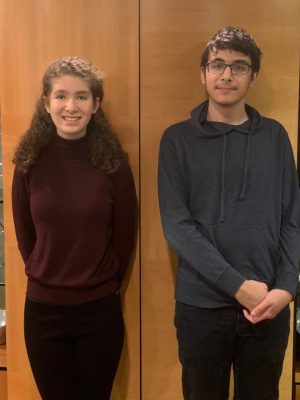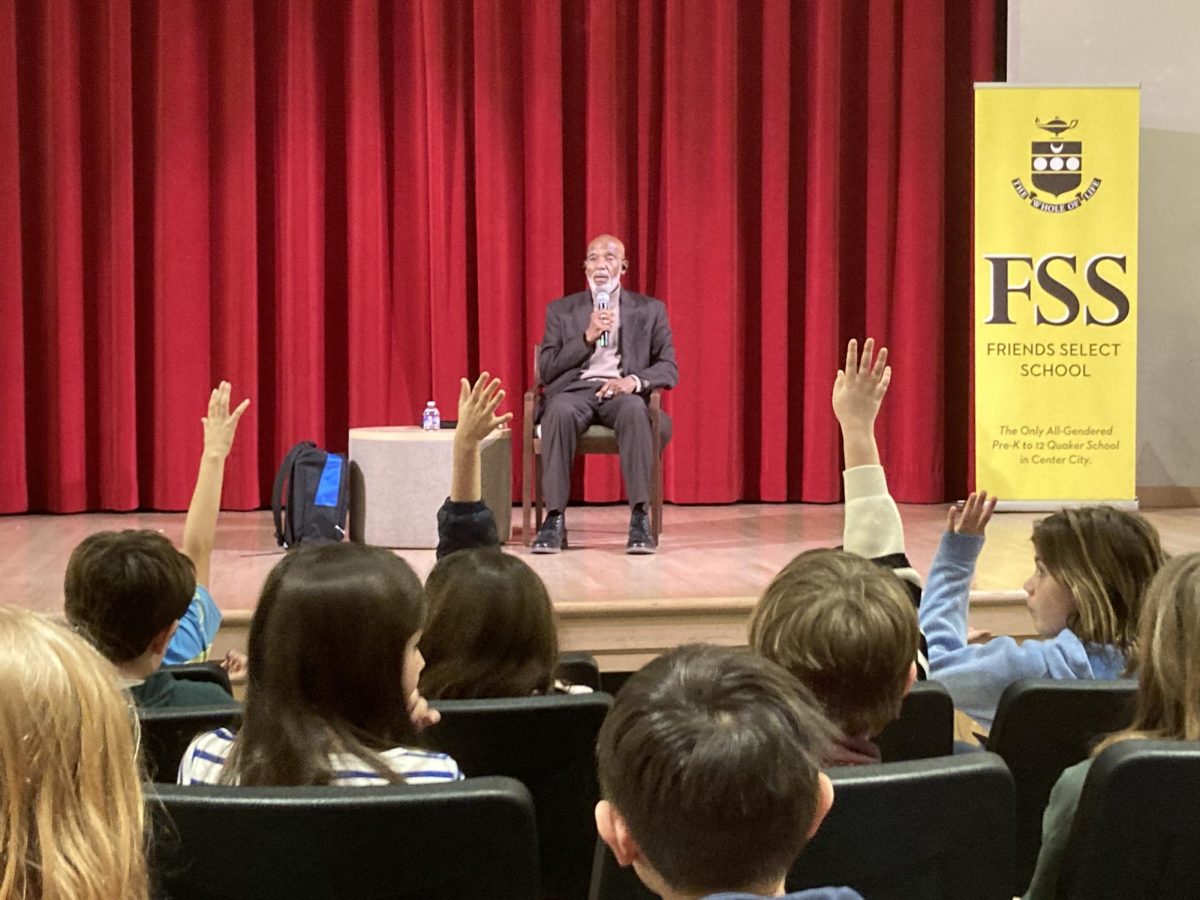The Sundry Siblings of Friends Select

The Ryan’s 
The Schneider’s 
The Coleman’s 
The Siegel’s 
The Bushee’s 
The Sovinski’s 
The Wampler’s 
The Verstegan’s 
The Squires’s 
The Ryan’s 
The Levine’s
Friends Select’s Alma Mater asserts that students see the school as their “home and school in one.” While there is some merit to this sentiment, students surely keep some separation between their lives at home and at school. For students with siblings in the upper school, though, their separate lives begin to merge: family dynamics can bleed into the school day, and vice versa.
Each set of siblings agreed that having a brother or sister at school changed their high school experience in some respects. A majority of interviewed students expressed appreciation for the support their siblings provided. “Overall, having a sibling in high school is a nice thing because you can have somebody there for you,” says Scarlett Schneider ‘24. “I would probably be more lonely without my sister (at school),” Eva Verstegen ‘24 adds. According to Patrick Ryan ‘24, sharing a sense of humor with one’s sibling makes high school more fun: “It allows me to get up to more hijinks,” he says.
Having an older sibling at Friends Select can be academically beneficial for underclassmen. “I always have someone to teach me about the next grade and what to expect in it,” says Lucy Rupertus ‘23. In Scott Aaronson ‘24’s opinion, having an older brother “helps a lot because it feels like I have a mentor through high school.” Twins also find their relationships helpful in classes. “We have the same teachers and friends and learn everything at the same time,” shares Beatrix Verstegen ‘24. According to both Amelia and Madeline Squires ‘22, “we want to see each other do equally as well.” Patrick disagrees, saying: “I’ve never asked for advice. [Peter] gives unsolicited, unhelpful advice.”
However, some younger siblings conveyed resentment towards the shadows often set by their older siblings. “My teachers expect me to be similar to [my brother Zach], but hopefully after they get to know me, they will see we are different,” says Rose Levine ‘24. Becca Bushee ‘23 recalls a teacher who “who absolutely thought I was a carbon copy of [her brother Jacob] and completely undermined things I said.” Scarlett, Patrick, and Adelle Wampler ‘24 all said they were frequently called by their older sibling’s name. Patrick, though, welcomed these comparisons: “it both creates expectations for you and creates a foundation for you… I need those expectations,” he says.
Although some might expect that sibling rivalries extend to the classroom, most Friends Select families don’t feel any academic competition. “Many people might think that since we are in the same grade and have most of the same classes, we’d be competitive with each other, but in reality we want to see each other do well,” says Madeline Squires ‘22. Jacob Bushee ‘22 adds, “It would be a problem if we were because we would just get in fights.” The only semblance of competition comes from public opinion rather than true rivalry: “I feel like everyone always challenges me without words to compete with my sister,” said Scarlett.
Many pairs spend time together and share friends. “Scott and I actually hang out a good bit. I will hang out with him in between classes, and we share a lot of friends,” says Mark Aaronson ‘21. Annie Rupertus echoes this, saying: “[My sister and I] occasionally hang out at school, and we have some people in common between our two friend circles.” Sometimes, these friendships are due to family friendships; Rose, Scarlett, and Patrick are friends with their older siblings’ buddies.
Some sets of siblings share interests and extracurricular activities, but others, like Adelle, do not: “[Coleman and I] have very different interests and he never pressured me into doing anything I didn’t want to do,” she says. However, many siblings end up participating in the same extracurriculars. “[Margot and I] have played on the same sports teams in the past, and probably will in the future. We’re both in Quake and JSU,” shares Scarlett. Most, though, don’t feel pressure to follow in their sibling’s footsteps. Lucy, who participates in the White Antiracism Group and Diversity Clerks with Annie, says she doesn’t feel any pressure to follow Annie’s lead, noting: “we are just in some clubs together because we both care a lot about social justice and diversity work.”
Attending Friends Select with a sibling can also be convenient. Lucy and Annie both note how it is nice to “have someone to sit with on the train” in the mornings. Rose also says that “when [Zach and I] both play sports, we will walk home together.” Liv Coleman ‘21 notes: “Now, even when [she and her brother Sol] are busy we still see each other even if it’s just catching up on our commute home.” Mark says that having a sibling in the Upper School “has actually made our travel routine a lot easier. We are on the same schedule and can go to and leave from school a lot more easily.” Patrick, however, experiences difficulties with his brother in the morning: “Peter likes to wear costumes to school. We left the house 10 minutes later than we would have because he wanted to dress up [in a costume].”
Twins at Friends Select often support each other even more closely than other siblings at Friends Select. “We have the same teachers and friends and learn everything at the same time,” says Beatrix, adding that “it makes it a little easier.” The Squires also assist each other academically by “helping each other study.” Both the Squires and Verstegens share friends and activities. “We hang out all the time in school and we have the same exact friends,” says Madeline. “My sister and I have practically switched best friends many times,” adds Eva. However, these dynamics can also occasionally deprive twins of their individuality: “we’re seen as a unit instead of an individual,” reports Beatrix.
Teachers are also aware of the dynamic between student sibling pairs. English teacher Miriam Rock notes she “loves having siblings in classes and clubs!” She also adds she is “very cautious of attributing things to younger siblings based on their older siblings.” She does note, though, that she sometimes makes connections with younger siblings of former students more easily, because she “assumes that the older sibling has told the younger sibling about me.” Miriam enjoys having siblings together in Quake, to which she serves as faculty advisor: “when siblings are members of the same class or club, they bring this deep comfort level with them that often translates to making the rest much more willing to take risks and grow.”
Athletic Director Bill Klose adds a coach’s perspective: “I try really hard not to compare siblings, because I know I hated it when I was younger.” He notes the importance of “taking the time to get to know each person individually” because it “helps minimize any comparisons.” He adds that the dynamic of the team can “definitely be changed when siblings are on the same team. It is comparable to best friends being on the team… it can alter the mood in practice.”
Overall, both students and teachers expressed appreciation for sibling connections in the Upper School. Annie notes, “The best thing is having someone in my family who‘s also really familiar with the dynamics at school who I can talk to.” Siblings can serve as friends, confidants, and mentors, reminding each other that they are “not going through things alone,” as Becca puts it. Miriam has “noticed that upper school siblings seem so much more excited to see each other this year than they have in past years.” Bill adds: “[Adults] have to pay close attention to their relationships. Sibling relationships are forever and way more important [than other things at school].”






















